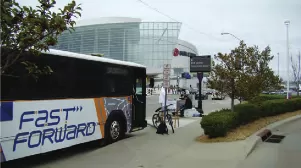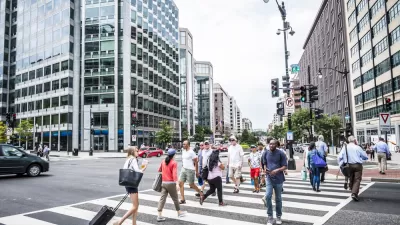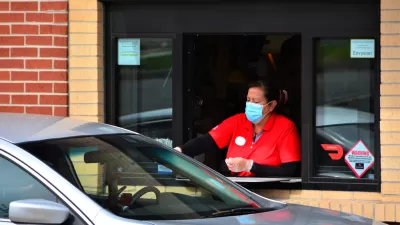Progress in combating climate change won't be possible unless Americans drive less. And Americans won't be able to drive less without changes to land use patterns in the United States.

"The Senate Democrats’ Special Committee on the Climate Crisis recently released a report recommending key federal actions in each sector to avert the impacts of climate change," according to an article by Rayla Bellis. First among the actions recommended in the report: the transportation sector should do more to enable more Americans to choose walking, biking, and walking over car trips.
Writing for Transportation for America, Baylis acknowledges that the report incorporates a number of the organization's recommendations for preventing the impacts of climate change, but the new report is noteworthy separate from that success in a few ways, including its attention to land use as a determinant of car trips in addition to its recommendation to enable non-automobile mobility.
In late August, the Senate Democrats’ Special Committee on the Climate Crisis released a climate action report that proposes the kind of paradigm shift that’s needed. The report doesn’t merely go beyond electric vehicles—it leads its transportation section with recommendations on the importance of reducing how much people need to drive by building walkable, transit-served communities where people can live and work in the same area.
The report lays blame for the current car-centric nature of most U.S. cities at the feet of 20th century zoning practices, according to Ballis. The report suggests that despite the inherently local powers of land use control in the United States, federal policy reform could go a long way toward the kinds of outcomes described above.
The Senate report recommends that the federal government provide significant new funding and financing to promote smart growth, safer streets, and public transportation options. Done right, those strategies can be a potent tool to reduce emissions, while addressing critical issues of equity and housing affordability in the process.
Also of note, the report says many of the same land use reforms will be important to implement in rural areas, not just urban areas.
Ballis concludes by noting that the report is an important first step, but far from the legislative action that will be required to achieve true progress on any of these recommendations. "Reports like this are only meaningful if they actually impact federal transportation policy," writes Ballis.
FULL STORY: Senate Democrats recommend less driving—as Senate committee approves billions for new roads

Alabama: Trump Terminates Settlements for Black Communities Harmed By Raw Sewage
Trump deemed the landmark civil rights agreement “illegal DEI and environmental justice policy.”

Study: Maui’s Plan to Convert Vacation Rentals to Long-Term Housing Could Cause Nearly $1 Billion Economic Loss
The plan would reduce visitor accommodation by 25% resulting in 1,900 jobs lost.

Planetizen Federal Action Tracker
A weekly monitor of how Trump’s orders and actions are impacting planners and planning in America.

Wind Energy on the Rise Despite Federal Policy Reversal
The Trump administration is revoking federal support for renewable energy, but demand for new projects continues unabated.

Passengers Flock to Caltrain After Electrification
The new electric trains are running faster and more reliably, leading to strong ridership growth on the Bay Area rail system.

Texas Churches Rally Behind ‘Yes in God’s Back Yard’ Legislation
Religious leaders want the state to reduce zoning regulations to streamline leasing church-owned land to housing developers.
Urban Design for Planners 1: Software Tools
This six-course series explores essential urban design concepts using open source software and equips planners with the tools they need to participate fully in the urban design process.
Planning for Universal Design
Learn the tools for implementing Universal Design in planning regulations.
Caltrans
Smith Gee Studio
Institute for Housing and Urban Development Studies (IHS)
City of Grandview
Harvard GSD Executive Education
Toledo-Lucas County Plan Commissions
Salt Lake City
NYU Wagner Graduate School of Public Service





























